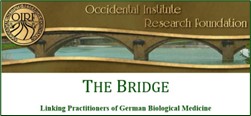POINTS OF INTEREST
The following article came across my desk from an unknown source a few weeks ago. Although all of you are aware of the benefits and pitfalls of supplementation, I found this to be a precise and useful guideline for patients. With that in mind, we then need to get to work and test (with EAV or VEGA or whatever method) to determine not only the correct supplement for the individual, but also the correct dosage.
Are Mega-Doses of Vitamins Safe?
In today’s health conscious society, much attention has been paid to vitamin supplementation and the role it plays in total body health. In addition to promoting optimum wellness, vitamin supplements are taken for reasons such as protecting the heart, reducing the risk of cancer, boosting the immune system, relieving the symptoms of PMS, alleviating depression and anxiety, improving the memory and even weight loss.
There have been some publicized theories that advocate the use of extremely high doses, or mega-doses, of certain vitamins. Care should be taken when considering this kind of supplementation. While some vitamins are safe in large doses, other can be harmful. Here are the most commonly used vitamins and the safest maximum doses for each.
Vitamin A: Vitamin A is a fat-soluble compound that is crucial for healthy vision, cell growth, and immune system function. Vitamin A should not be taken in excess of 10,000 IU which is twice the daily recommended allowance for adults.
Vitamin B6: Vitamin B6 is a water-soluble vitamin that is required for protein metabolism, the delivery of oxygen to cells, and the regulation of blood glucose. Excessive Vitamin B6 can cause debilitating and dangerous nerve damage. Do not exceed 100 mg of Vitamin B6 per day.
Vitamin B12: Vitamin B12 is essential to healthy red blood cells and never cells in the body. Vitamin B12 also plays a vital role in the creation of human DNA. Although this compound is well tolerated and has a low level of toxicity, it is recommended that you do not exceed 3,000 mcg per day.
Folic Acid: Folic acid contributes to the development of DNA, and is also needed for the metabolism of important amino acids. It is especially crucial for pregnant women. Folic acid has a low toxicity level, however the recommended maximum dose for adults is 1,000 mcg.
Vitamin C: Vitamin C is necessary for the production of collagen, growth and repair of the body’s tissues, and a healthy immune system. However, too much Vitamin C can cause harmful oxidation in the body. No more than 2,000 mg per day should be consumed.
Vitamin D: Vitamin D is essential for normal levels of phosphorus and calcium in the blood. Vitamin D is an important contributor to strong bones and teeth. Excessive Vitamin D intake (more than 10,000 IU) can lead to bone pain, nausea, vomiting and even kidney stones.
 A Re-printed Article for Members
A Re-printed Article for Members
From THE BRIDGE Newsletter of OIRF
Published February 2011
Author unknown


